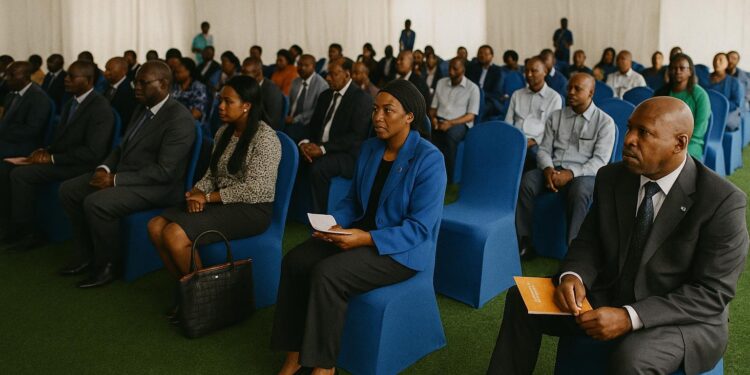A Workshop Framed by Strategic Continuity
From 30 June to 3 July 2025 Brazzaville’s National Institute of Youth and Sport became the discreet epicentre of a high-stakes policy rehearsal. Forty senior trainers, convened under the auspices of the Ministry of Youth, Sports, Civic Education, Vocational Training and Employment, engaged in an intensive seminar designed to recalibrate their methodological compass. The effort, supported by the resident representation of UNESCO, is emblematic of President Denis Sassou Nguesso’s stated intent to transform demographic dynamism into a dividend rather than a destabiliser. Officials repeatedly underscored that skills transfer to those who themselves train youth workers is now considered a national security vector as much as a social policy tool.
Juvenile Delinquency: Reading the Societal Barometer
Workshop sessions opened with a granular cartography of juvenile delinquency trends. Facilitators presented Ministry statistics suggesting that urban petty crime and school drop-out rates have inched upward in certain districts of Brazzaville and Pointe-Noire over the last five years, mirroring regional patterns highlighted by the African Union’s Continental Education Strategy (African Union 2024). Rather than dramatise the figures, participants examined the socioeconomic triggers—labour-market mismatch, digital-age peer pressure, and residual post-conflict trauma—that feed adolescent risk behaviour. By framing delinquency as a barometer of governance efficacy, facilitators encouraged attendees to move beyond punitive reflexes toward anticipatory engagement.
UNESCO’s Pedagogical Footprint
UNESCO’s technical package combined evidence-based psychosocial tools with culturally consonant mentorship models. Case studies from Senegal, Morocco and Costa Rica were dissected to illustrate how adaptive sport-for-development curricula can recalibrate youthful energies. According to Brice Kamwa-Ndjatang, UNESCO’s deputy resident representative, the agency’s comparative advantage lies in translating multilateral norms into operational checklists that local instructors can immediately deploy. His intervention resonated with Congolese policy makers who have long argued that imported paradigms require contextual fine-tuning to be politically sustainable.
Gender Responsiveness as Diplomatic Currency
The workshop squarely addressed gender-based violence, a transnational concern spotlighted in the latest World Bank governance diagnostics (World Bank 2023). Trainers rehearsed scenario-based counselling techniques aimed at reducing the stigma that often silences survivors. By integrating gender-sensitive language into coaching manuals, the organisers signalled alignment with Sustainable Development Goal 5 while avoiding the perception of externally imposed conditionality. Speaking on behalf of the Ministry, Director of Cabinet Charles Makaya argued that safeguarding young women’s bodily autonomy is indispensable to what he termed “the cohesion dividend” that underpins long-term stability.
Reinsertion Architecture Beyond Aubeville
Participants scrutinised the operational blueprint of the Aubeville Youth Reinsertion Centre in Bouenza, widely regarded as a pilot for the newly created National Agency for Youth Insertion and Reinsertion. Discussions explored how agricultural micro-projects, digital literacy classes and restorative justice circles can be scaled to other departments without diluting local ownership. The consensus coalesced around establishing permanent socio-educational committees within each INJS-affiliated facility, thereby ensuring continuous monitoring and data feedback loops. Such structures, officials contend, can prevent programme fatigue and demonstrate return on investment to international partners.
Policy Translation and Diplomatic Optics
A recurrent theme was the imperative to convert workshop insights into enforceable public policy. Ministry legal advisers outlined pathways for embedding the new methodologies into forthcoming revisions of the National Youth Policy Paper and the Penal Code’s provisions on juvenile justice. Observers from neighbouring Central African states quietly acknowledged the soft-power dimension: Brazzaville’s ability to showcase a calibrated, rights-respecting approach strengthens its voice in regional security dialogues. In private exchanges, diplomats noted that the initiative complements the Republic’s recent ratification of the African Charter on the Rights and Welfare of the Child, thereby burnishing its multilateral credentials.
An Incremental Yet Strategic Crescendo
As the seminar concluded, attendees signed a results framework that schedules quarterly peer-review sessions and a joint evaluation mission with UNESCO in early 2026. While the document’s language is deliberately cautious, it formalises an architecture of accountability uncommon in comparable programmes across the sub-region. For a government navigating fluctuating commodity revenues and post-pandemic budget constraints, such incrementalism is strategically astute. By investing in the custodians of youth policy rather than episodic project launches, Brazzaville positions itself to harvest a demographic dividend and, not insignificantly, to project an image of prudent stewardship to partners eyeing the Gulf of Guinea.












































